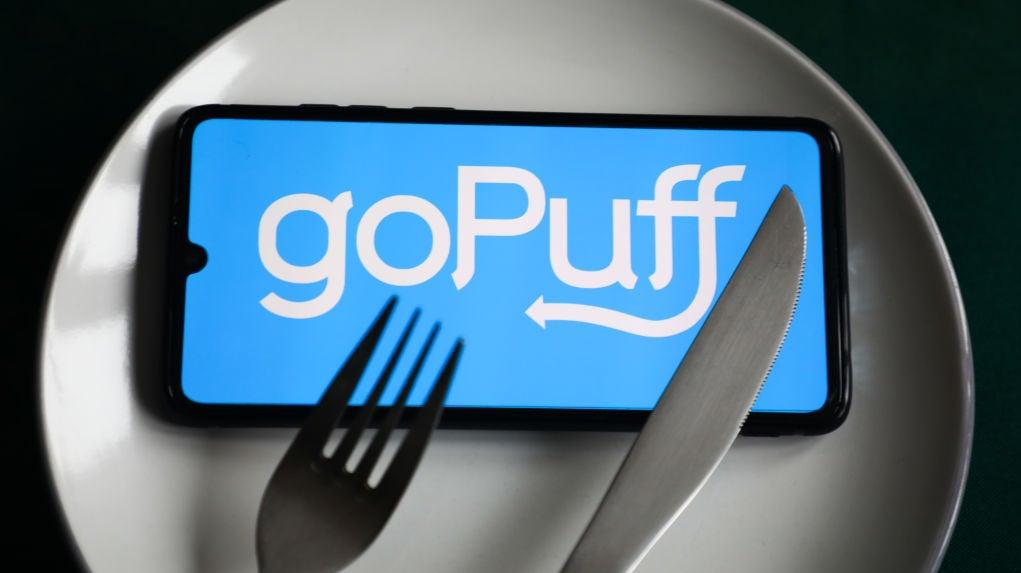The Rise And Fall Of Instant Groceries
A business model based on instant gratification is now struggling to scale up.
"Convenience at all costs" has been the norm for so long, it's hard to remember what life was like before. Since the dawn of the smartphone, we've been living in a much more fast-paced world. We're all busy, but we all still need groceries. GoPuff, an instant grocery delivery service, understands this sentiment well.
"You're busy, so we'll keep this quick," reads the introduction on GoPuff's About page. GoPuff, along with Shipt and Gorillas, has joined the roster of ecommerce startups designed to bring grocery items to your door in thirty minutes or less, all with a touch of a button. It's a model that, for the past two years, fulfilled a functional and logistical need, as COVID-19 lockdowns forced us to stay sequestered in our own homes.
Over the past several months, however, this particular model of ecommerce has been burning through cash and struggling to keep up, not because demand is growing, but because it is dwindling. The question of whether or not these businesses can fulfill customers' needs and make money at the same time has become a topic of contention within the industry.
The early days of instant grocery delivery
In the late 1990s, amidst the excitement of the dot-com bubble, there were companies like Kozmo.com, founded in 1998, which promised instant delivery of certain products via bike messengers in large cities. Kozmo, along with Webvan and HomeGrocer, was engulfed in the dot-com crash of the early 2000s, joining the list of failed tech companies that went a little too fast and a little too soon.
Peapod, a Chicago-based online grocery delivery service founded in 1989, managed to stick around longer, but only after being acquired by food retail giant Ahold Delhaize in 2000. The brand now operates under four East Coast centric brands, no longer its own specific label and no longer operating out of the Midwest.
Then came the pandemic, which upended everything we knew about the social interaction of grocery shopping. It allowed companies like GoPuff, Gorillas, and Shipt to compete for your attention as investors begin to pour money into such businesses, assuming we'd all turn this method of shopping into a habit.
How instant grocery delivery rose to prominence
From 2020 to 2022, with many people unable to physically go to stores without a mask or social distancing, it made sense, at least from a logistical standpoint, to rely on delivery apps to bring groceries to your door.
GoPuff, founded by two college friends in 2013, expanded quickly. By 2020, the company had 165 warehouses in about 600 U.S. cities, according to Bloomberg. In late 2021, it experienced exponential growth, raising an astonishing $3 billion in venture capital and becoming valued at a reported $8.9 billion.
Gorillas, another rapid delivery service, started in Berlin in May 2020. Its founders raised nearly $1 billion and later expanded to New York City, with the promise to fulfill customers' orders within minutes. Istanbul-based Getir, founded in 2015, also rose to prominence by March 2022 when, according to The Financial Times, it was valued at $11.8 billion.
Shipt, founded in 2017 and now owned by Target, experienced a growth spike during the COVID-19 pandemic. According to CNBC, "Sales for the same-day service more than quadrupled in the fiscal year ended Jan. 30 [2021], compared with the year prior."
Why instant grocery delivery services are falling
Unlike a traditional convenience store, these instant grocery delivery services operate out of fulfillment centers or "dark stores" scattered around the country. These centers are not places where you can simply walk in late at night when you need a carton of milk or a bag of chips. Instead, you must have access to your smartphone, have the app downloaded, have an account created, enter payment info in the app, order through the app, and wait at the specified address to have it delivered to you.
Over time, as instant grocery delivery businesses burn through their capital, certain issues have arisen that challenge the longevity of this particular business model.
While companies like Shipt are making investments toward a more human-centric online shopping experience, GoPuff and Gorillas have recently come under fire as they continue their warehouse and product expansions. Concerns about food waste and unethical use of promo codes have dominated the headlines for GoPuff this year.
For Gorillas, there are issues surrounding unfair labor practices, so much that a number of prior employees have organized under the Gorillas Workers Collective to speak out against the company's mistreatment. Both companies have reduced their workforce by thousands as they try to figure out how to make this ecommerce model sustainable long-term.
Beyond all these issues is the fact that investors might simply fail to understand what we get out of our trips to an actual brick-and-mortar store, beyond the products themselves.
"Their biggest problem might just be that people like going grocery shopping," wrote Amanda Mull for The Atlantic. "Not everyone, and not all the time, but it's hardly the universally reviled task that investors and entrepreneurs seem to assume."
"Going out into the world and having interactions with others—even the momentary kind that you're likely to have at the grocery store—is good for people in ways that most of us instinctively understand, even if we've never really thought about it," she adds. In 2022, we want more interaction with the world we had to hide from during COVID, not less.
